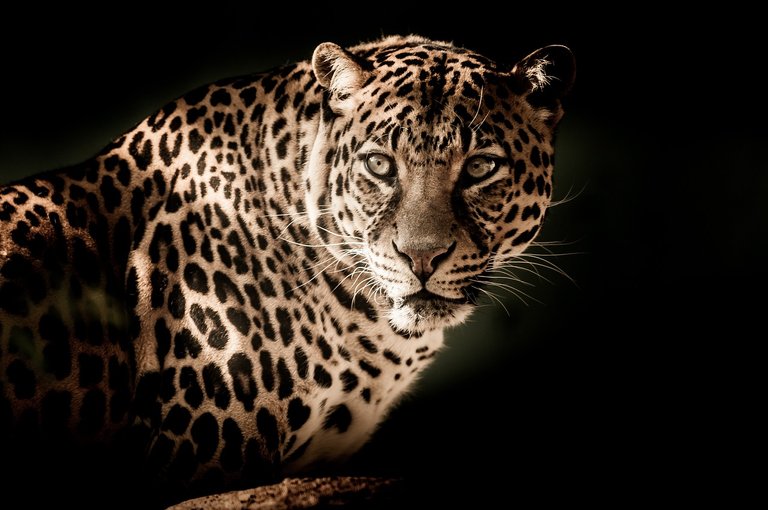The African Leopard! Nature's Most Elusive, Yet Stealthiest Predator
The African Leopard , Nature's Most Elusive, Yet Stealthiest Predator
The African leopard is one of the most elusive predators in the animal kingdom. It's also one of the stealthiest.
This magnificent creature is known for its distinctive spotted coat, which helps it to blend in with its surroundings. The leopard can hide in plain sight, stalking its prey without being detected

Image by Ian Lindsay from Pixabay
But despite its stealthy nature, the leopard is an incredibly powerful predator. It's capable of taking down prey much larger than itself, including animals such as antelopes and zebras.*
Now let's take a closer look at the African leopard – its physical characteristics, hunting methods and conservation status.
All about the African Leopard
Video by Go Wild
Hey, you! Yes, you, the one reading this, You're probably thinking to yourself, "What the heck is an African leopard?" or "Why should I care?"
Well, glad you asked. The African leopard is one of the most elusive creatures on the planet. It's also one of the most powerful predators, thanks to its stealthy tactics and incredible strength.
This magnificent animal has been around for millions of years and has adapted to many different environments. Despite its shy nature, the leopard is one of the most fascinating creatures in the animal kingdom.
Behavior and Habitat of the African Leopard
The leopard is truly the king of the jungle. He may not be as big as a lion or as ferocious as a tiger, but what he lacks in size he makes up for in cunning. This is the animal that can sneak up on its prey and take it down without making a sound.
Leopards are solitary animals, preferring to live and hunt alone. They are mostly nocturnal, although they can be seen during the day on rare occasions. They are found in a variety of habitats, from dense forests to open plains. And they can range over a large area – up to 100 square kilometers!
So how do you know if you're being hunted by a leopard? You don't. There's no way to know for sure until it's too late. Stealthy, powerful, and adaptable – the African leopard is one predator you don't want to mess with.
Hunting and Diet of the African Leopard
The African leopard is one of the most elusive predators in the wild. This big cat is known for its stealthy hunting techniques and diet of mostly antelope.
You may never see one in the wild, but if you're lucky, you might get a glimpse of this magnificent creature as it stalks its prey across the African savannah. With its stealthy movements and powerful jaws, the leopard is undoubtedly one of nature's most impressive predators.
Unique Adaptations & Stealth Tactics Used by Leopards
When you think of the African leopard, perhaps the first thing that comes to mind is its appearance. But what about its unique adaptations and stealth tactics? Well, you’d be surprised by how clever these big cats can be!
Leopards have an uncanny ability to hide in plain sight. Their golden coats provide the perfect camouflage while they stalk their prey among trees and bushes. Aside from their exceptional vision, they also have an incredibly acute sense of hearing and smell, allowing them to detect the slightest movements of their prey.
Even more impressive is their extraordinary jumping power, which allows them to scale trees in one swift leap, making them one of the stealthiest predators in all of Africa. So if you ever find yourself trekking through Africa’s wilderness, stay alert and watch your back – because you never know when you might get surprised by one of these elusive felines.
Current Threats to African Leopards
Now, let's discuss the current threats to African leopards. If you thought hunting was bad, brace yourself for this one - human activity is majorly impacting their habitats. Think about it, you wouldn’t have liked it if someone suddenly started building a cottage right in your backyard!
Yes, that’s precisely the kind of threat African leopards face every day; reduced access to their natural habitats due to human agricultural expansion, uncontrolled urbanization and infrastructure development.
Furthermore, due to their high demand in the illegal pet trade and body parts used in traditional medicines and rituals, they are being hunted down relentlessly. That said, conservationists are working tirelessly to protect these big cats so that they don't bite the dust like many other predators before them.
What You Can Do to Help Protect African Leopards
If you believe in helping out a fellow wild animal, you can lend a hand and help protect the African Leopard. There are several ways to do so: doing research on their behavior, habitat, and biology; donating to organizations that are committed to preserving the Leopards’ habitat; and reducing your own environmental footprint.
African Leopards need all the support they can get these days, so don’t be shy to give them a shout-out in your social media circles! Openly advocating for their protection will help generate awareness and start meaningful conversations about the conservation of this magnificent species. Who knows - maybe it’ll be enough stalking for them to make a comeback!
Conclusion
So, if you ever find yourself in the African bush and happen to come across a leopard, don't panic! Just remember to keep as silent and still as possible, and hopefully this stealthiest of predators will simply pass you by. Hopefully
There are some wild animal that are actually going out of extinct and one of them is leopard
Very true, uhm, I should write on that
Thanks for your contribution to the STEMsocial community. Feel free to join us on discord to get to know the rest of us!
Please consider delegating to the @stemsocial account (85% of the curation rewards are returned).
You may also include @stemsocial as a beneficiary of the rewards of this post to get a stronger support.